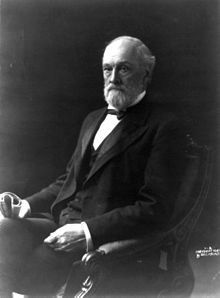Platt Amendment
The Platt Amendment (literally: "Platt Amendment") is a law passed by the United States Congress on March 2, 1901 , which was formally passed as a supplement to the US Army Budget Act, hence the official name of the law: An Act Making appropriation for the support of the Army for the fiscal year ending June thirtieth, nineteen hundred and two ("Law on the provision of maintenance for the army in the fiscal year ending June 13, 1902"). War Minister Elihu Root had drafted the amendment; it was named after Senator Orville H. Platt from Connecticut , who submitted it to the Senate . The Platt Amendment was intended to regulate the conditions for the withdrawal of American troops from Cuba and the Cuban-American relations after Cuba was occupied by the United States in the Spanish-American War in 1898 .
Under pressure from the US government, the Platt Amendment was included as an amendment ( English amendment ; Spanish enmienda ) in the Cuban constitution. In the first vote, the Constituent Assembly of Cuba rejected the Platt Amendment by a vote of 24: 2. After a visit to Washington , the vote on an amended interpretation of the treaty resulted in 15:14 votes. Only the third vote on June 12, 1901 resulted in 16:11 votes for the original version after the US threatened to keep Cuba occupied until a government adopts the Platt Amendment.
The addition was verified in a 1903/04 treaty between the United States and Cuba. The key point is "the right of the USA to intervene in Cuba to preserve Cuban independence, to maintain the government that guarantees the protection of life, property and individual freedom" (Article III). In addition, Article VII of the Platt Amendment stipulates the right of the United States to “buy or lease” stretches of land from Cuba and use them as naval bases. Indeed, the United States intervened several times in Cuban history to safeguard its national and economic interests; for example, in 1934 they deposed the Cuban President Ramón Grau San Martín .
The agreement was part of the "good neighbor policy" in May 1934 ( good neighbor policy ) of the American President Franklin D. Roosevelt canceled, and Section VII, whose abolition the stock of the US Naval Base Guantanamo Bay would have endangered, has been retained.

